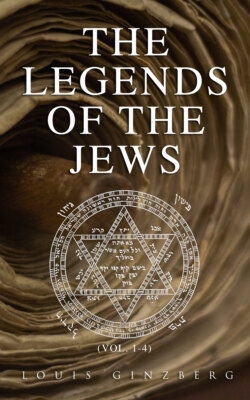Читать книгу The Legends of the Jews (Vol. 1-4) - Louis Ginzberg Ginzberg - Страница 69
На сайте Литреса книга снята с продажи.
THE STAR IN THE EAST
ОглавлениеTerah had been a high official at the court of Nimrod, and he was held in great consideration by the king and his suite. A son was born unto him whom he called Abram, because the king had raised him to an exalted place. In the night of Abraham's birth, the astrologers and the wise men of Nimrod came to the house of Terah, and ate and drank, and rejoiced with him that night. When they left the house, they lifted up their eyes toward heaven to look at the stars, and they saw, and, behold, one great star came from the east and ran athwart the heavens and swallowed up the four stars at the four corners. They all were astonished at the sight, but they understood this matter, and knew its import. They said to one another: "This only betokens that the child that hath been born unto Terah this night will grow up and be fruitful, and he will multiply and possess all the earth, he and his children forever, and he and his seed will slay great kings and inherit their lands."
They went home that night, and in the morning they rose up early, and assembled in their meeting-house. They spake, and said to one another: "Lo, the sight that we saw last night is hidden from the king, it has not been made known to him, and should this thing become known to him in the latter days, he will say to us, Why did you conceal this matter from me? and then we shall all suffer death. Now, let us go and tell the king the sight which we saw, and the interpretation thereof, and we shall be clear from this thing." And they went to the king and told him the sight they had seen, and their interpretation thereof, and they added the advice that he pay the value of the child to Terah, and slay the babe.
Accordingly, the king sent for Terah, and when he came, he spake to him: "It hath been told unto me that a son was born to thee yesternight, and a wondrous sign was observed in the heavens at his birth. Now give me the boy, that we may slay him before evil comes upon us from him, and I will give thee thy house full of silver and gold in exchange for him." Terah answered: "This thing which thou promisest unto me is like the words which a man spoke to a mule, saying, 'I will give thee a great heap of barley, a houseful thereof, on condition that I cut off thy head!' The mule replied, 'Of what use will all the barley be to me, if thou cuttest off my head? Who will eat it when thou givest it to me?' Thus also do I say: What shall I do with silver and gold after the death of my son? Who shall inherit me?" But when Terah saw how the king's anger burned within him at these words, he added, "Whatever the king desireth to do unto his servant, that let him do, even my son is at the king's disposal, without value or exchange, he and his two older brethren."
The king spake, however, saying, "I will purchase thy youngest son for a price." And Terah made answer, "Let my king give me three days' time to consider the matter and consult about it with my family." The king agreed to this condition, and on the third day he sent to Terah, saying, "Give me thy son for a price, as I spoke unto thee, and if thou wilt not do this, I will send and slay all thou hast in thy house, there shall not be a dog left unto thee."
Then Terah took a child which his handmaid had borne unto him that day, and he brought the babe to the king, and received value for him, and the king took the child and dashed his head against the ground, for he thought it was Abraham. But Terah took his son Abraham, together with the child's mother and his nurse, and concealed them in a cave, and thither he carried provisions to them once a month, and the Lord was with Abraham in the cave, and he grew up, but the king and all his servants thought that Abraham was dead.
And when Abraham was ten years old, he and his mother and his nurse went out from the cave, for the king and his servants had forgotten the affair of Abraham.
In that time all the inhabitants of the earth, with the exception of Noah and his household, transgressed against the Lord, and they made unto themselves every man his god, gods of wood and stone, which could neither speak, nor hear, nor deliver from distress. The king and all his servants, and Terah with his household, were the first to worship images of wood and stone. Terah made twelve gods of large size, of wood and of stone, corresponding to the twelve months of the year, and he paid homage to them monthly in turn.
